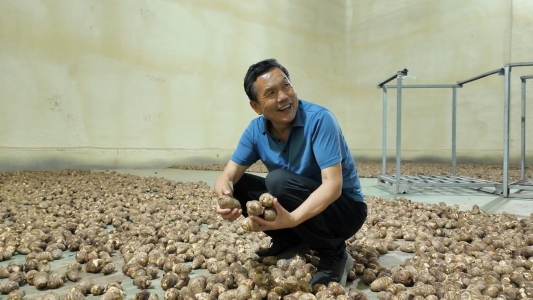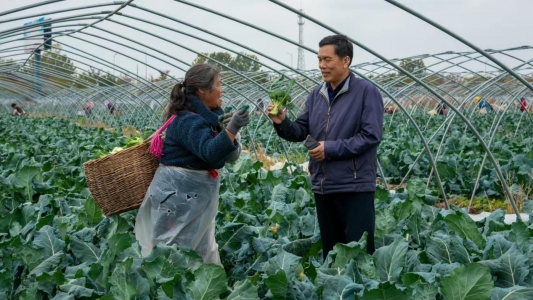Author:
Release time: 2025-08-22 02:01:01
View number: 41
Natural agricultural products refer to those agricultural commodities that follow natural laws and ecological principles during planting and breeding, refrain from using artificially synthesized chemicals such as chemical fertilizers, pesticides, growth regulators, and feed additives, and have obtained relevant certifications (such as organic certification). Their advantages are mainly reflected in the following aspects:
I. Safer and healthier, reducing health risks
- Reducing chemical residues: Natural agricultural products are prohibited from using artificially synthesized pesticides, chemical fertilizers, antibiotics, etc., in the production process, thus avoiding the residues of these chemicals in the products. For example, insecticides and herbicides that may be used in traditional planting can enter the human body through food via their residues. Long-term accumulation may increase the risk of allergies, digestive system diseases, and even cancer. Natural agricultural products, however, can minimize such hidden dangers.
- Richer in nutrients: Natural planting relies on the natural fertility of the soil (such as organic fertilizers, green manures, etc.), and crops have a longer growth cycle, enabling them to absorb minerals (such as calcium, iron, zinc, etc.) and vitamins in the soil more fully. Studies have shown that natural vegetables usually contain higher levels of antioxidants such as vitamin C and β-carotene than conventionally grown agricultural products. These components help enhance immunity and delay aging.
II. Purer taste, retaining original flavors
The growth of natural agricultural products is not interfered by chemicals such as ripening agents and sweeteners, and fully follows the natural growth rhythm, thus retaining the original flavor of the crops themselves. For instance, naturally grown tomatoes have a more balanced sweet and sour taste and firmer flesh; naturally grown rice has a more intense fragrance and chewier texture after cooking. This pure taste is hard to be replaced by conventional agricultural products, which often use chemical interventions to pursue yield and appearance.
III. Protecting the ecological environment and promoting sustainable development
- Maintaining soil health: Natural planting adopts methods such as crop rotation, straw returning to the field, and application of organic fertilizers, which can increase the organic matter content in the soil, improve the soil structure, and avoid problems such as soil compaction and acidification caused by excessive use of chemical fertilizers in conventional planting.
- Reducing environmental pollution: The non-use of chemical pesticides and fertilizers can reduce water eutrophication caused by their entry into rivers and lakes through rainwater runoff, as well as reduce air pollution caused by pesticide volatilization. At the same time, it protects natural enemies of pests (such as birds, frogs, etc.) and maintains the biodiversity of the ecosystem.
- Saving resources: Natural agriculture pays more attention to the rational use of water resources (such as drip irrigation, sprinkler irrigation) and avoids energy consumption in the production process of chemicals, which is in line with the concept of "low-carbon and environmental protection" for sustainable development.
IV. Guaranteeing the food safety chain and enhancing consumer trust
The production, processing, transportation and other links of natural agricultural products are subject to strict standards and supervision (for example, organic certification requires full traceability). Consumers can query the production process of products through certification marks, traceability codes, etc., thus having more confidence in food safety. This transparent supply chain can effectively avoid food safety issues such as "excessive pesticide residues" and "abuse of hormones", and is especially suitable for groups with high requirements for food safety, such as children, pregnant women, and the elderly.
V. Boosting rural economy and promoting the transformation of green agriculture
Natural agricultural products have high added value, which can bring higher economic benefits to farmers, encourage more farmers to switch to eco-friendly planting modes, and promote the transformation of traditional agriculture to green and organic agriculture. At the same time, natural agriculture is often combined with industries such as rural tourism and ecological agricultural sightseeing, forming an integrated business model of "planting + tourism", which promotes rural revitalization and the sustainable development of agriculture.
In conclusion, natural agricultural products are not only beneficial to human health but also an important link connecting "personal health" and "ecological health". Their advantages cover multiple dimensions such as health, taste, environment, and economy, making them an important choice for people pursuing a high-quality life in the context of modern consumption upgrading.
(4) (34).jpg)
(4) (30).jpg)
(5) (3).jpg)
(5) (1).jpg)
.jpg)
.jpg)
.jpg)
(4).jpg)
(4) (12).jpg)
(4) (21).jpg)




